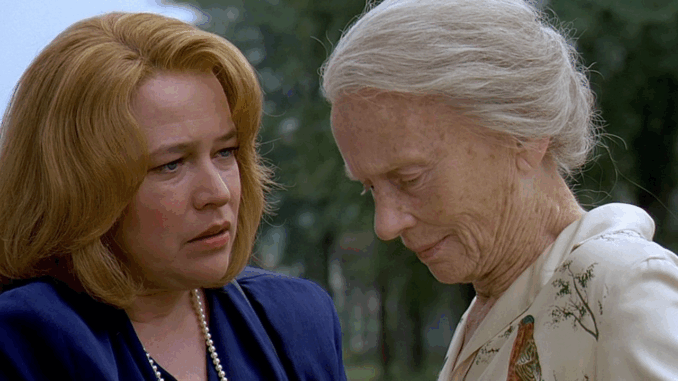
While Fried Green Tomatoes centers around adult relationships—especially the powerful bond between Ruth and Idgie, and later between Evelyn and Ninny—the presence of children serves a subtle but deeply emotional function. They are more than background figures; they represent innocence lost, generational trauma, and the possibility of renewal.
From tragic losses to quiet moments of joy, the children in the story echo the emotional heartbeats of the adults around them.
Buddy Threadgoode Jr.: A Life Cut Short, A Lasting Impact
The first child we encounter significantly is Buddy Jr., Ruth and Idgie’s adopted son (Ruth’s biological child). His very existence is born out of tragedy — his mother is in an abusive marriage, his biological father (Frank Bennett) is cruel and possibly dangerous, and he is eventually rescued by Idgie and Ruth.
Despite this, Buddy Jr. grows up in one of the most loving environments in the film: the Whistle Stop Café. He is raised by two women who, whether explicitly or implicitly, build a family rooted in care, humor, and freedom.
Buddy Jr. also serves as a symbolic namesake of Idgie’s lost brother, Buddy Threadgoode, whose tragic death in childhood haunts Idgie throughout her life. By giving Ruth’s son the same name, Idgie perhaps reclaims something of her lost past — offering love where there was once grief.
The Original Buddy: Trauma as Catalyst
The death of young Buddy Threadgoode—run over by a train while retrieving a hat—is the emotional event that fractures Idgie’s childhood. It’s not just a moment of loss; it is the end of her innocence.
In the immediate aftermath, Idgie withdraws from family life, isolates herself, and becomes “wild.” This trauma, experienced at such a young age, shapes her entire worldview. She becomes suspicious of attachments, fiercely independent, and deeply protective of those she loves. Ruth later becomes the first person since Buddy to reach that inner part of her again.
Buddy’s death is not just a turning point for Idgie, but a narrative device that reminds us: children can absorb the world’s cruelty long before they understand it.

The Unseen Children: Evelyn Couch’s Longing
Although Evelyn Couch’s story unfolds decades later, her relationship with children is emotionally complex. She is a mother — but her children are grown and distant, rarely mentioned except in passing. This estrangement subtly underscores Evelyn’s feelings of being forgotten, unneeded, and invisible.
Her visits to the nursing home, and especially her bond with Ninny, awaken maternal instincts she has suppressed or lost touch with. There’s a quiet ache in Evelyn’s eyes when she hears about Ruth and Idgie raising Buddy Jr. — it reminds her of the emotional connection she once had as a mother, and perhaps still desires.
Children as Bridges Between Generations
Children in Fried Green Tomatoes serve another role: they link past and future.
-
Buddy Jr. represents the hope that love can outgrow trauma.
-
The original Buddy reminds us that childhood loss can define an entire life.
-
Evelyn’s children (though never seen) represent the emotional disconnect that haunts modern families.
Even the young Idgie, as we see her in flashbacks, is a child filled with possibility — the kind of spirited girl many viewers might recognize in themselves or their own children. She defies gender norms, questions the world, and walks her own path, scars and all.
Childhood Never Really Ends
The film’s exploration of children is quiet, even sparse — but it is there, always pulsing underneath. In a story about healing and memory, children are reminders of where it all begins: joy, pain, love, fear.
Whether it’s the smile of Buddy Jr. running through the café or the phantom memory of Buddy Threadgoode’s laughter echoing near the tracks, Fried Green Tomatoes tells us something powerful:
The past is never really gone, because childhood — its heartbreaks and hopes — lives in every adult we become.
